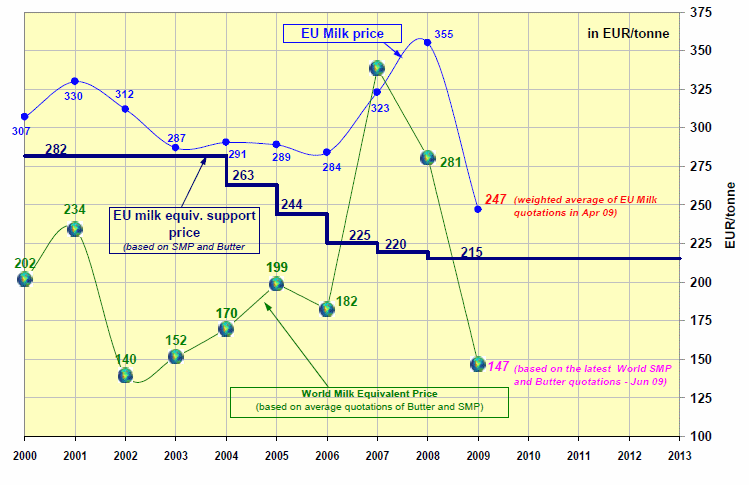Earlier in the month I wrote that Agriculture Commissioner Mariann Fischer Boel was holding the line against protesting dairy farmers and a clutch of national agriculture ministers looking for more aid for their troubled farmers. It looks as though I spoke too soon. At this month’s farm council, Commissioner Fischer Boel found a further 280 million euro from the 2010 budget to give to dairy farmers, in addition to measures announced last month.… Read the rest
Fischer Boel holds the line on milk
Regular readers of this blog will know by now that I don’t count myself among Agriculture Commissioner Mariann Fischer Boel’s greatest fans. I think she fudged what turned out to be a very costly reform of sugar subsidies, bears a share of the responsibility for the collapse of the Doha Round, missed a golden opportunity to reform the CAP during the ‘health check’ and – perhaps above all – has failed to articulate an intellectually robust vision for the future of European agriculture policy. She is stepping down soon and this task will fall to her successor. However, I will give credit where it’s due and she’s doing a fine job of holding the line against protesting dairy farmers seeking more government aid.… Read the rest
Back to butter mountains?
It’s a familar scenario: the milk price falls; farmers come out to the street; and the Commission starts to panic. Following a ‘milk strike’ across Europe, an emergency meeting is to be held by farm ministers on October 5th. Nineteen member states have signalled support for a Franco-German initiative for an aid package for dairy farmers. However, farm commissioner Mariann Fischer Boel, insists that there is no prospect of reversing the decision to abandon dairy quotas as part of the CAP reform process.… Read the rest
The Commission milk market report
The Commission today produced its report on the dairy market requested by the European Council in June, and Commissioner Fisher Boel has underlined its main findings in her blog. The background to the current market crisis is shown clearly in the graph reproduced from the Commission report.
Pressure building on Commission to postpone milk quota reform
If there was a jewel in the crown of the CAP health check deal agreed last November it was probably the decision to phase out milk quota between now and 2015, with a one per cent increase in quota each year. But this prize is now under threat as several powerful EU member states led by Germany have argued at today’s Agriculture Council meeting that the reform should be postponed. … Read the rest
Can the old policy instruments have any effect?
The resort to intervention buying and export refunds in the dairy sector has been predictably bad PR for the EU, especially in the southern hemisphere. But a more fundamental question is, can these tired old policy instruments work any magic in a deep economic crisis?… Read the rest
Return of the butter mountain
It was the recession of the 1930s that ushered in agricultural protectionism and subsidies, not least in the United States. Now the European Union has reverted to two of its old favourite policy instruments: intervention buying and export subsidies in the dairy sector just when we thought we had seen the last of them. Stocks of butter disappeared completely in 2007.
Faced with a drastic drop in dairy prices, the EU is to buy 30,000 tons of butter at a guaranteed price. Over three times as much skimmed milk powder is to be purchased – 109,000 tons. In addition, export subsidies will be given to skimmed milk powder, butter, butter oil and cheese.… Read the rest
Dairy quota row highlights industry divisions
Commissioner Mariann Fischer Boel’s proposal for five annual dairy quota increases of 1 per cent each, adopted unchanged by farm ministers, is under attack from two sides. The Commission believes that this is a sure sign that it has negotiated a fair middle path through a morass of conflicting objectives. A less charitable interpretation would be that the needs of an internationally competitive industry have been partially sacrificed to those of marginal farmers with political clout.… Read the rest
Milk quota removal could cost EU farmers €4 billion
The elimination of milk quotas as currently foreseen in 2015 will result in a loss to producers of €4 billion, and a gain to consumers of €3.7 billion, according to research by economists at the Institut d’Economie Industrielle in Toulouse. The group were asked to evaluate the impacts of the expiry of the EU milk quota system, comparing particularly a ‘soft landing’ scenario in which milk quotas are gradually increased between now and 2015, and a ‘hard landing scenario’ in which quotas are maintained until 2015 and then eliminated in that year. The ‘hard landing’ scenario postpones the adverse effects for producers both in competitive milk-producing countries (where quota rents are currently high) as well as in countries which currently are not meeting their quota.… Read the rest
The milk quota mess
As the debate goes on in the EU about whether milk quotas can be increased by 2 per cent as part of the soft landing when they are eventually abolished in 2015, it is an opportunity to reflect how milk quotas have affected the UK dairy industry. They were introduced in 1984 to ease the severe budgetary crisis brought about by the structural surplus of milk in Europe. They worked in terms of limiting production growth and coping with the budgetary crisis, but they brought a lot of unintended (or intended) problems in their wake.… Read the rest

 …
…